- Home
- Jeff Mariotte
Serpents in the Garden Page 6
Serpents in the Garden Read online
Page 6
Farther down-canyon, the musky odor intensified, and the tension of the Freeholders increased accordingly. The scent triggered flashes of memory in Kirk, though he couldn’t yet piece them together into a cohesive picture. He was trying to do just that when the beast broke from the trees and rushed them, head down. A high-pitched roar tore from its throat.
Mugato.
Kirk remembered it all now, the memories rushing through his mind like floodwaters from a bursting dam.
The creature was pink-fleshed and covered in a thick mat of white fur. Vaguely apelike, it had a thick bone horn on top of its head and spikes jutting from its spine. When it charged, a wave of stink preceded it, like a miasmic cloud of effluvium from which there was no escape. Its bite was venomous, a painful lesson Kirk had learned on his last trip to Neural, and nearly always fatal. Only the intercession of Nona and her timely application of mahko root had saved Kirk’s life.
His hand dropped to his side, but his phaser was buried in the hills. All he had was the lever-action rifle the Freeholders had provided.
The Freeholder nearest the attacking creature raised his flintlock, but the mugato batted it aside before he could get off a shot. Tyree fired once, his shot going wild and crashing through overhead branches. With another roar, the beast knocked the man it had disarmed to the ground and fell atop him, snarling and snapping as it tried to close its jaws on the man’s throat. Its tail whipped back and forth, discouraging anyone from interfering.
The Freeholders crowded around, one swinging his flintlock like a club. The mugato swatted it away. “I can’t get a clean shot,” Hay complained. “They’re too close! I might hit one of them.” Burch and Rowland angled for shots, too, but with similar results.
Kirk had the same concern, but the Freeholder had only seconds to live. Once the creature buried its teeth, the venom would be transmitted. They were already too far from the settlement to get him back in time, even if there were a Kahn-ut-tu with a handy supply of mahko root there.
He couldn’t wait for an opportunity; he had to make one. Kirk threw himself into the midst of the Freeholders, knocking Tyree and another one aside. The second man fell to the ground, swore at Kirk, and whipped a knife from his belt as he came up, seemingly intent on punishing Kirk for the assault. The admiral ignored him and pressed his rifle’s barrel against the mugato’s skull. The creature yanked its head away at the last instant, but the shot grazed its head, and the noise and flash must have had an impact. The mugato staggered, releasing its hold on the downed man. Kirk fired again even as the mugato grabbed his gun barrel and wrenched the weapon away. His second shot tore through the thing’s upper arm.
With a final horrific growl, the thing threw Kirk’s gun at him and raced back into the woods. Hay and Burch, their way clear now, fired several shots at its retreating form, until Kirk waved them down.
“What in the hell was that?” Rowland asked.
“That was a mugato, Mister Rowland,” Kirk answered. “The local predator I mentioned, a real top-of-the-food-chain type. Enjara’s lucky he wasn’t bitten—the mugato’s bite is almost always fatal. It’s gone now, though. Tyree, is your man all right?”
Tyree was kneeling beside the fallen man. “He is not bitten,” he reported. “Only stunned. I think he will be fine.”
“Sorry I had to crash into you like that.”
“You and your friends saved Enjara’s life,” Tyree said. “Thank you for your actions.”
Kirk extended a hand to the man on the ground and helped him to his feet. “My thanks,” Enjara said. “That mugato nearly had me.”
“Glad we could help,” Kirk said.
“But at what cost?” Bardee asked. He wore a necklace made of dried human ears strung together, one of the grisly souvenirs Tyree had mentioned. “We drove off the mugato, but the noise of our fire sticks will surely have alerted any Victor patrols in the area.”
“We’ll just have to be wary,” Kirk said. As they started once more down the canyon, he thought again about his phaser, with which he had easily dispatched a mugato. It was a far quieter weapon than these, and more efficient.
The Prime Directive is a sound policy, he thought, but sometimes it’s a giant pain in my neck.
* * *
Sticking to the seldom-traveled game trails, they managed to get within a few miles of the city—near enough that the industrial stench from the smelters overpowered the natural smells of the forest. Kirk was reminded of what historians said London, in Victorian times, looked like when smoke from chimneys in what was then Earth’s largest city bonded with moist air coming off the Thames to create a choking fog that left every surface it touched covered with a black, sooty film. Victory was a long way from that, but if it continued on its present course, it might yet achieve it. It even had a river that, like the Thames, bisected the town, sparkling now in the midday sun.
Nearing the juncture where the hills gave way to the flat valley beyond, Kirk noticed an uneven quality to some boulders they passed, as if something had split them and then set them back slightly off level. He halted the party and eyeballed the landscape in both directions from there. Sure enough, there was a visible seam running in a fairly straight line.
“What is it, Admiral?” Rowland asked.
“It looks like a fault line,” Kirk replied. He pointed out the differentiation to the Freeholders. “Do you know anything about this?”
The Freeholders conferred briefly. “It has not always been here,” Tyree said. “Only for a few years. In fact . . .” He pondered for a moment longer. “In fact, it came here not long after you left, the last time. A few months, perhaps. Some said it was caused by a giant snake slithering out from underground. Others believed we had done something to make the world angry.”
“When it appeared, was there a . . . a violent shaking of the ground?”
Another brief conference ensued. “We cannot be sure, exactly,” Tyree reported. “But near that time, yes. It even toppled trees near our home. This was before we built walls around Freehold, but some of those fallen trees were the ones we used first, when the time came to raise the walls.”
“It was an earthquake,” Kirk said.
“A what?” Tyree asked.
“Beneath the surface of your planet, the continents rest on giant masses of rock and earth. We call them plates, tectonic plates.” He demonstrated with his hands. “They are in constant, very slow, motion. They pull away from some and move toward others, and sometimes they collide. When they do, mountain ranges can be formed by the upthrusting of material from below. And sometimes as they shift around, earthquakes occur. The earth shakes and rifts like this can be formed. It’s entirely natural.”
“Tyree!” This was Enjara, who was out in front. He lowered himself to a crouch and motioned for the others to do the same.
“What is it?” Tyree asked.
Enjara pointed across the valley. The wild grass here grew nearly as tall as a man, but through occasional gaps Kirk could make out figures walking toward the hills. “Slavers,” Enjara said.
“I see them,” Tyree said.
“I make twelve, no, fourteen of them,” Kirk whispered.
“To our eight,” Kenomo said. “We should fight them.”
“That’s not why we came,” Kirk countered. “We came to see what the Victors are up to. If we engage with a small party, they’ll just send reinforcements out. That’s a no-win game.”
“A what?”
“Never mind,” Kirk said. “Point is, fighting them won’t achieve our goal, and it might get us killed. Let them go.”
“Our homes are that way, James,” Tyree reminded him.
“I know. But what’s better, stopping one small group from possibly getting near Freehold? Or figuring out how to stop the Victors once and for all?”
“When you say it like that,” Tyree admitted, “the answer seems clear.”
“Let’s get a look at their operation,” Kirk said. “On the way home, if we see those
slavers, you can decide whether you still want to engage with them. Fair?”
“Fair,” Tyree said. He checked again. The slaver party was out of sight. “Come,” he said. “But stay low. We might encounter more Victors at any time.”
Eight
Another hour or so of cautious movement, following the general course of the fault line all the way, brought them near a vast pit surrounded by a tall wire fence with coiled razor wire topping it. Guard towers stood at periodic intervals along the fence line. What looked like banks of spotlights were mounted on the towers, and although they were dark, they indicated some form of electrical power. Between the fence and the grassy plain at the edge of which they had stopped were forty yards of bare earth, scraped clean of even a single wayward weed. Kirk doubted that Victor technology had made the fence or the lights, but he couldn’t be certain. In the near distance, on the other side of the pit, brick chimneys spat smoke into the air. This close, he could hear a steady rumble from the building beneath the chimneys, in addition to voices wafting from inside the pit.
“Looks like this is as close as we get,” Kirk announced.
“But we can’t see inside,” Burch said.
“No, but look across the way.” He pointed to the far wall of the pit, terraced by pathways. The raw earth inside the pit ranged in color from brown and rusty red through oranges and yellows. On Earth, Kirk would have thought those colors signified iron-rich soil, perhaps threaded with copper. But as Earthlike as Neural was in many respects, when it came to the geophysical makeup of the planet, he could make no such assumptions. “That’s definitely a pit-mining operation.”
“Which confirms our theory that that thing’s a smelter,” Rowland said, graciously omitting the fact that it had been his theory to begin with.
Kirk eyed what he could see of the city beyond the pit and the smokestacks. It looked like any city from Earth’s early industrial age—low-rise buildings and streets paved with stone, more chimneys issuing streamers of smoke into the air. “Victory is no garden spot,” he said. “But it’s significantly more advanced, technologically, than it was the last time I was here. They’ve got electricity, for one thing.”
“Which confirms our other theory,” Rowland said.
“I don’t know if I’d say ‘confirms,’ Mister Rowland. But it does point in that direction.”
The unspoken word hung between them.
Klingons.
If the Klingons had returned, taken up where they left off in providing technology and know-how to the Victors, then such a city could have developed in a few short years.
Still, Kirk was left without hard evidence. He scanned in every direction for some sign of a Klingon presence. He saw only Neuralese people—Victor overseers and slave labor that looked to be predominantly Hill People, but all of them locals. The guards held lever-action rifles and wore knives at their belts, but not Klingon disruptors or bat’leths.
“Do you see any Klingons?” he asked Rowland quietly.
“No, sir. We could try to get in closer.”
“The guards in those towers would spot us the second we got out onto that bare patch,” Kirk pointed out. “If they haven’t already.”
“I haven’t seen any signs that they have,” Rowland replied.
“Neither have I. But we should fall back before they do. Getting caught here isn’t on my agenda for the day.”
“We haven’t accomplished much, sir.”
“Being captured or killed won’t change that. We wanted a closer look, and we got one. Eventually we’re going to have to get inside the city, but we’ll need more prep time for that. In the meantime, we’ve ascertained that they are indeed engaged in a large-scale mining and smelting operation, and using forced labor to do it. That fits in with the theory that Klingons are behind this. It’s a small step,” he admitted. “But it’s progress.”
“Yes, sir.”
“Come on,” Kirk said. “Let’s get out of here.” He didn’t add, while we’re still in one piece.
But he thought it just the same.
* * *
Apella led the way into his security office, resisting the impulse to rub his hands together with glee. But only just.
Krell had put his faith in Apella from the very beginning. There had been times over the years when he’d worried that the Klingon warrior had considered that faith misguided. The terrible period when the Klingons had left the planet and the Hill People had gained new weaponry, from some as yet unknown source, had been one of the darkest patches of Apella’s life—never knowing if he would survive from one day to the next, not knowing if his benefactors would ever return, or if his village would fall to the Hill People’s wrath.
But the Klingons did come back before long, and they brought the power to quell resistance once and for all. Oh, the Hill People’s settlement yet stood, under its foolishly audacious name. But Apella’s village had a new name, as well, one that was more suited to its new status: Victory. Apella had chosen it himself, after being told of a statement that the wife of Tyree, the Hill People’s chieftain, had made. She had approached some Villagers, offering what she said was a weapon that would guarantee Apella’s victory. The woman had died, and after that the Hill People had somehow acquired flintlocks of their own, and the Klingons had left.
But when the Klingons had returned, the Villagers had expanded their advantage. Apella had used the woman’s word for his city’s new name as a taunt, his own private joke. The name Freehold was a desperate fable, something its residents clung to, knowing all along that whenever the Victors decided enough was enough, they could march in, knock down Freehold’s walls, and take whatever and whomever they desired.
For now, let the Freeholders raise up a new crop of laborers. The Victors would take them when they were strong enough to be useful.
“What is it you wish to show me?” Krell demanded as they entered the office. His accent was so thick that he was almost unintelligible, a condition made more pronounced when his patience was waning. “My time is valuable.”
“I believe you will be pleased by this, honored Krell,” Apella said. Again, he tamped down the urge to gloat, even though he doubted that Klingons had a problem with gloating. They probably valued it as a noble act.
Funny, how he could work so closely with them for so long, yet know so little about their culture.
“I had better be,” Krell said.
In the security office, a single Victor sat in a straight-backed wooden chair before a viewscreen. The office contained two desks, a rack of weapons, and some equipment Vlettor knew how to use but Apella didn’t. The image on the screen was fuzzy. Klingon technology, when powered by Victor energy sources, often functioned at less than full efficiency.
“Show Krell what you saw, Vlettor,” Apella instructed.
“Yes, Governor Apella,” Vlettor said. Krell had promised Apella that title, and now every Victor called him that, as did every prisoner and laborer, at least once they had felt the sting of the lash. Vlettor’s hands flew across the control panel too fast for Apella to follow. Klingons had trained him well.
In a few moments, the screen went dark, then blinked back to life showing what appeared to be a distant view of a grassy field. But as Vlettor twitched a control stick, the grass fell away, as if seen through the eyes of someone moving quickly through it. When the image settled again, it showed eight people hunkered at the edge of the field. All were armed. Apella recognized only one of them, the tall, lean man with pale blond locks who was the acknowledged leader of Freehold: Tyree. In days gone by, they had been friendly rivals, sometimes cooperating on hunts. Some of the others had the features common to Freeholders, the tanned skin and long, light hair. But despite having donned local garb, something about the other four hinted to Apella that they were strangers here.
“We had visitors today,” Apella said. “These people stared at the pit for long minutes, but did not dare to approach.”
“Let me see,” the Klingon said gr
uffly. “Stand aside.”
He shouldered Apella out of the way and stood before the viewscreen, his legs apart, hands clasped behind his back. After a moment, he stiffened, the muscles of his neck going taut. Krell’s hands tightened almost to the point that Apella wondered if he was hurting himself. “What is it, Krell?” he asked.
The Klingon whirled around. He didn’t look cheerful at the best of times—Apella was accustomed to that, and he had taken to wearing an approximation of Krell’s typical sour grimace when he wanted to intimidate those around him. But now Krell looked positively furious, and a momentary fear for his life made Apella’s knees start to buckle. He caught himself on a nearby console. “What?”
Krell stabbed a finger at one of the figures on the viewscreen. “Kirk,” he said. “That one. I recognize him. He is the enemy of every Klingon.”
“And he is here? On Neural?”
“If this image was captured today, then he is here. Close by.”
“I will find him,” Apella said. “I will put the Klingon’s hated enemy to work in the mines. No day will pass without my lash flaying the flesh from his bones.”
Krell’s expression softened. “If you can,” he said, “you will truly be a friend to the Klingon Empire.” He moved past Apella, toward the door. “I must report this,” he said. “Qo’noS must know that Kirk is here.”
Then he was gone. Apella turned to Vlettor. “Tell no one of this,” he said, trying his best to adopt the tone of haughty arrogance Krell typically used. “If you see that one again—any of those—report it to me immediately. But only to me. Is that understood? Only to me, on pain of torture and a long, slow death.”
Apella left the security office and strode out to a deck from which he could look down into the pit. He liked this view—the Freeholders and other captives laboring away, working with shovels and picks and simple steel bars, or loading carts with ore and hauling them up the sloping ramps that snaked around the pit’s sides. His own people standing watch, alert for signs of sluggishness or resistance and ready to punish either. One of the guards raised his gaze and met Apella’s eyes briefly. He gave him a casual nod, all the acknowledgment the man needed or deserved.

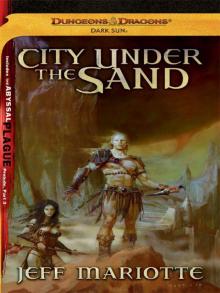 City Under the Sand
City Under the Sand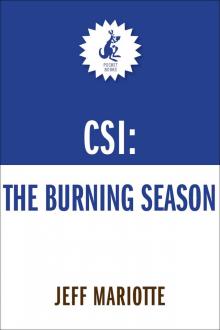 The Burning Season
The Burning Season Sanctuary
Sanctuary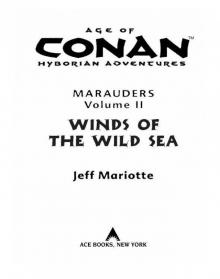 Winds of the Wild Sea
Winds of the Wild Sea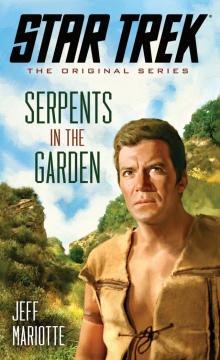 Serpents in the Garden
Serpents in the Garden Close to the Ground
Close to the Ground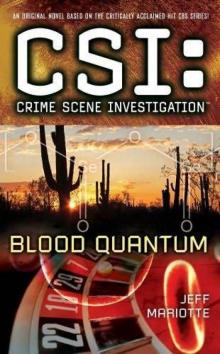 Blood Quantum
Blood Quantum Brass in Pocket
Brass in Pocket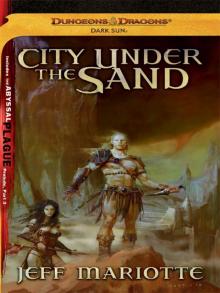 City Under the Sand: A Dark Sun Novel (Dungeons & Dragons: Dark Sun)
City Under the Sand: A Dark Sun Novel (Dungeons & Dragons: Dark Sun)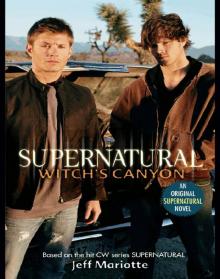 Witch's Canyon
Witch's Canyon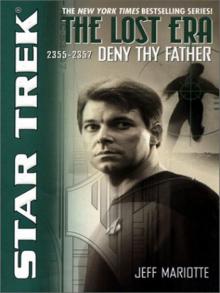 STAR TREK: The Lost Era - 2355-2357 - Deny Thy Father
STAR TREK: The Lost Era - 2355-2357 - Deny Thy Father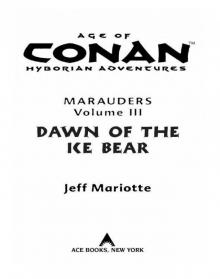 Dawn of the Ice Bear
Dawn of the Ice Bear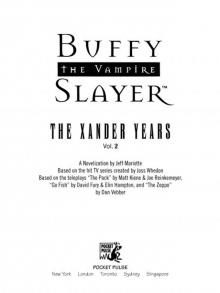 The Xander Years, Vol.2
The Xander Years, Vol.2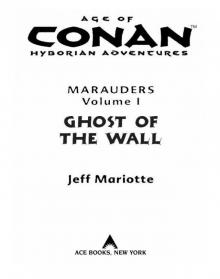 Ghost of the Wall
Ghost of the Wall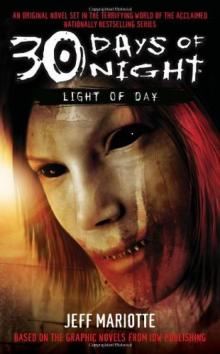 30 Days of Night: Light of Day
30 Days of Night: Light of Day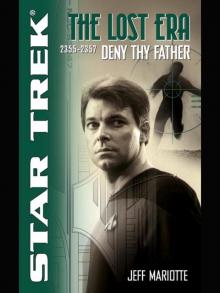 Deny Thy Father
Deny Thy Father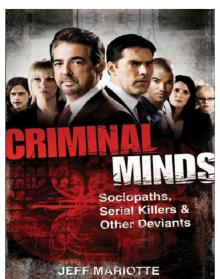 Criminal Minds
Criminal Minds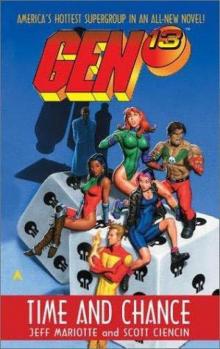 Time and Chance
Time and Chance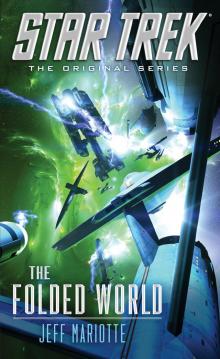 The Folded World
The Folded World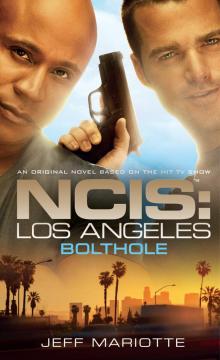 Bolthole
Bolthole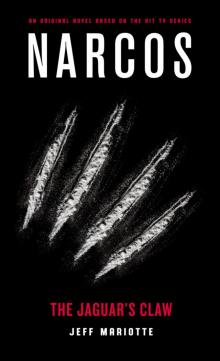 Narcos
Narcos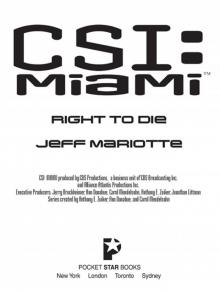 Right to Die
Right to Die